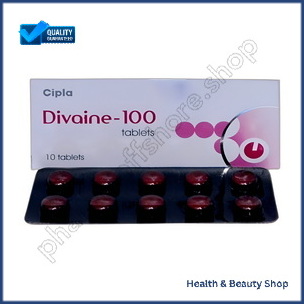ADDICTION
ALCOHOL DEPENDENCE
QUIT SMOKING
ALLERGY
ANTI FUNGAL
FUNGAL INFECTION
FUNGAL NAIL INFECTIONS
ANTI-REJECTION DRUGS
ANTI WORM
ANTIBIOTIC
BACTERIAL INFECTIONS
ARTHRITIS
GOUT
OSTEOARTHRITIS
RHEUMATOID ARTHRITIS
BLOOD
LOW PLATELET COUNT
THROMBOPHLEBITIS
VARICOSE VEINS
COLON
ANAL FISSURE
PILES
ULCERATIVE COLITIS
DIABETES CARE
DIABETES INSIPIDUS
DIABETES TYPE
DIABETIC FOOT ULCERS
GLUCOSE MONITOR
EYES/EAR CARE
DRY EYES
EYE CARE
EYE EXAMINATION
EYE INFECTION
EYE LASHES
EYE PAIN
GLAUCOMA
OCULAR HYPERTENSION
UVEITIS
FEVER CARE
MALARIA
RHEUMATIC FEVER
TYPHOID FEVER
GASTROINTESTINAL
ACIDITY
CONSTIPATION
CROHN'S DISEASE
DIARRHOEA
GALLBLADDER STONES
INTESTINAL ULCERS
IRRITABLE BOWEL SYNDROME
MOTION SICKNESS
NAUSEA
Divaine (Minocycline)
Divaine 50 mg (Minocycline)
Divaine 100 mg (Minocycline)
| Active Ingredient (Generic Name): | Minocycline |
|---|---|
| Indication: | Bacterial Infections |
| Manufacturer | Cipla Limited |
| Packaging: | 10 tablets in a strip |
From: $71.00
If you’re seeking a medication that effectively combats bacterial infections, Divaine, with its active ingredient Minocycline, might be of interest to you. This antibiotic, part of the tetracycline class, is commonly prescribed for various infections, including respiratory, urinary tract, and skin issues. However, there’s more to this medication than meets the eye. Curious to uncover the nuances of its usage and potential benefits? Stay tuned for insightful information that could impact your health decisions.
Why is this medication prescribed?
Minocycline, also known as Divaine, is prescribed to treat bacterial infections. This medication belongs to a class of drugs called tetracycline antibiotics, which work by stopping the growth of bacteria. It is commonly used to treat a variety of bacterial infections, including respiratory tract infections, urinary tract infections, skin infections, and acne.
Divaine is effective against a wide range of bacteria, making it a versatile treatment option for different types of infections. Your healthcare provider may prescribe Divaine if they believe that a bacterial infection is causing your symptoms. It is important to take this medication exactly as prescribed and to finish the full course of treatment, even if you start to feel better.
While Divaine is generally well-tolerated, like all medications, it can cause side effects. Common side effects may include nausea, vomiting, diarrhea, and dizziness. If you experience severe or persistent side effects, contact your healthcare provider. Minocycline should not be used to treat viral infections such as the common cold or flu.
How should this medicine be used?
To use this medicine properly, follow the dosage instructions provided by your healthcare provider or pharmacist. Divaine (Minocycline) is typically taken by mouth, usually once or twice a day. It’s important to take the medication at evenly spaced intervals to maintain a consistent level in your body. You can take Divaine with a full glass of water, and it’s generally recommended to avoid lying down for at least 10 minutes after taking it to prevent any irritation in your esophagus.
It’s vital to complete the full course of treatment prescribed by your healthcare provider, even if you start feeling better before finishing the medication. Stopping the medication prematurely may lead to the infection not being fully treated, which could result in the infection returning or developing antibiotic resistance.
If you have any questions or concerns about how to use Divaine effectively, don’t hesitate to reach out to your healthcare provider or pharmacist for clarification and guidance.
Other uses for this medicine
Consider exploring other potential applications for Divaine (Minocycline) beyond its primary designated use under the guidance of a healthcare professional. While Divaine is commonly prescribed to treat bacterial infections, such as acne and respiratory tract infections, research suggests it may have other beneficial uses.
One area of interest is its potential anti-inflammatory properties, making it a candidate for conditions like rheumatoid arthritis and periodontal disease. Divaine’s ability to reduce inflammation could also be beneficial in managing certain skin conditions, such as rosacea or eczema. Additionally, some studies indicate that Divaine might have neuroprotective effects, leading to investigations into its use for conditions like multiple sclerosis or Alzheimer’s disease.
It’s important to note that using Divaine for off-label purposes should only be done under the supervision of a healthcare provider. They can assess the risks and benefits based on individual circumstances and help monitor for any potential side effects or interactions. Always consult with a healthcare professional before considering alternative uses for Divaine.
What special precautions should I follow?
When taking Minocycline (Divaine), it is important to check for any potential drug interactions that could affect its effectiveness or cause adverse effects. Always inform your healthcare provider about any other medications, supplements, or herbal products you are taking. This precaution helps guarantee your safety and the best performance of the medication.
Check for Drug Interactions
Be sure to always consult with your healthcare provider or pharmacist before starting Minocycline (Divaine) to check for any potential drug interactions. It’s crucial to guarantee the safe and effective use of this medication. Here are some key points to keep in mind:
- Provide a list of all medications, including prescription, over-the-counter, vitamins, and herbal supplements, to your healthcare provider.
- Inform your healthcare provider about any medical conditions you have, such as kidney or liver disease, to assess the potential interactions with Minocycline.
- Be cautious with medications like antacids, iron supplements, penicillin antibiotics, and blood thinners, as they may interact with Minocycline and affect its effectiveness or increase the risk of side effects.
What special dietary instructions should I follow?
For optimal effectiveness of Minocycline (Divaine), make sure to take this medication with a full glass of water and avoid consuming dairy products, calcium-rich foods, and antacids within 2 hours of taking it. These substances can interfere with the absorption of Minocycline in your body, reducing its efficacy. Instead, opt for a light snack or meal that is low in calcium when taking this medication. It is crucial to adhere to these dietary instructions to guarantee that Minocycline works as intended in treating your condition.
Additionally, remember to stay hydrated throughout the day while on Minocycline. Drinking plenty of water not only helps with the absorption of the medication but also aids in preventing potential side effects like stomach upset. Maintaining a balanced diet rich in vitamins and minerals while avoiding specific foods that can hinder Minocycline’s absorption will contribute to the overall effectiveness of your treatment. If you have any concerns or questions about your diet while taking Minocycline, consult your healthcare provider for personalized advice.
What should I do if I forget a dose?
If you miss a dose of Minocycline (Divaine), take it as soon as you remember. However, if it is almost time for your next dose, skip the missed dose and continue with your regular dosing schedule. Do not take a double dose to make up for a missed one. It’s important to maintain a consistent dosing routine to guarantee the effectiveness of the medication.
To help you remember to take your doses on time, consider setting an alarm or using a pill organizer. If you frequently forget doses, speak with your healthcare provider about potential strategies to enhance adherence.
Consistency in taking Minocycline is essential for the treatment of your condition. Missing doses can reduce the medication’s effectiveness and may lead to the development of antibiotic resistance. If you have any concerns or questions about missed doses or your medication schedule, consult your healthcare provider for guidance tailored to your specific situation.
What side effects can this medication cause?
Minocycline (Divaine) may cause side effects, some of which can be serious. If you notice any persistent side effects or experience symptoms like dizziness, severe headache, or difficulty breathing, it is important to contact your doctor immediately. Being mindful of potential side effects and seeking medical advice promptly can help guarantee your well-being while taking this medication.
Report Persistent Side Effects
Experiencing persistent side effects from Minocycline, such as dizziness or nausea, should be promptly reported to your healthcare provider. Some common side effects of Minocycline may include:
- Dizziness
- Nausea
- Fatigue
It is essential to communicate any ongoing side effects you may be experiencing while taking Minocycline to your healthcare provider. Keeping them informed allows for proper monitoring and management of your symptoms. Your healthcare provider can offer guidance on how to address these side effects or may suggest alternative treatment options if needed. Remember that your well-being is a top priority, and open communication about your health is critical for effective medical care.
Some side effects can be serious. If you experience any of the following symptoms, call your doctor immediately:
When experiencing serious side effects from Minocycline, prompt communication with your doctor is essential for immediate medical attention. Some side effects can be severe and require immediate medical evaluation. Call your doctor right away if you experience any of the following symptoms:
- Severe headaches
- Blurred vision or vision changes
- Difficulty swallowing or breathing
It’s important to be vigilant for these signs while taking Minocycline. Your doctor needs to be informed promptly to assess the severity of the side effects and determine the best course of action. Your health and well-being are of utmost importance, and seeking medical assistance for these symptoms is critical.
What should I know about the storage and disposal of this medication?
Properly store and dispose of Divaine to guarantee its effectiveness and prevent harm to others. Keep this medication in its original container, tightly closed, and away from moisture, heat, and light. Store it at room temperature, avoiding extreme temperatures. Do not freeze Divaine. Make sure it is out of reach of children and pets to prevent accidental ingestion.
When it comes to disposing of Divaine, do not flush it down the toilet or pour it down the drain unless instructed to do so. Properly discard this medication following local regulations or through a drug take-back program. If such programs are not available, mix the medication with an unpalatable substance like dirt or cat litter in a sealed plastic bag before throwing it in the trash. Remove any personal information from the medication packaging before disposal to protect your privacy. If you have any questions about how to store or dispose of Divaine, consult your healthcare provider or pharmacist for guidance.
In case of an emergency/overdose
If an emergency or overdose occurs with Minocycline (Divaine), immediately seek medical assistance. Overdosing on Minocycline can lead to symptoms such as severe dizziness, nausea, vomiting, or difficulty breathing. It is vital to act promptly in such situations to prevent any potential complications.
When contacting emergency services or visiting the nearest healthcare facility, provide as much information as possible about the medication ingested, including the dosage and the time of ingestion. This information will assist healthcare providers in determining the most appropriate course of action.
Do not attempt to induce vomiting unless instructed to do so by medical professionals. Additionally, refrain from taking any other medications or substances without medical guidance, as they may interact with Minocycline and worsen the situation.
It is important to keep Minocycline packaging or information readily available in case of emergencies, as this will help healthcare providers make informed decisions regarding treatment. Remember, swift action is vital in cases of overdose or emergencies involving Minocycline.
What other information should I know?
In addition to being aware of the risks of overdose, it is important to understand other essential information about Minocycline (Divaine). This medication may make you more sensitive to the sun, so it is vital to use sunscreen and wear protective clothing when outdoors. Avoid prolonged exposure to sunlight and tanning beds while taking Minocycline. It is advisable to take this medication on an empty stomach at least 1 hour before or 2 hours after meals, unless your doctor instructs otherwise.
Inform your healthcare provider about any other medications, supplements, or herbal products you are taking, as they may interact with Minocycline. This antibiotic can sometimes cause diarrhea, which may be a sign of a new infection. If you experience severe or persistent diarrhea, inform your doctor immediately. It is crucial to complete the full course of treatment prescribed by your healthcare provider, even if your symptoms improve before the medication is finished. If you have any concerns or questions about Minocycline, do not hesitate to consult your healthcare provider for guidance.
Brand names
When referring to Minocycline (Divaine), it is commonly known by the brand names available in the market. Here are some of the brand names under which Minocycline is sold:
| Brand Names | Manufacturer | Dosage Forms Available |
|---|---|---|
| Solodyn | Medicis Pharmaceutical Corporation | Extended-release tablets |
| Minocin | Meda Pharmaceuticals | Capsules, oral suspension |
| Dynacin | Pfizer | Capsules |
| Cleeravue-M | Graceway Pharmaceuticals | Capsules |
| Ximino | Ranbaxy Laboratories | Extended-release capsules |
These brand names may vary depending on the region and the pharmaceutical company producing the medication. It’s crucial to consult your healthcare provider or pharmacist to make sure you are receiving the correct medication under the brand name prescribed to you. Familiarizing yourself with the various brand names can also help you identify Minocycline in case it is marketed under a different name in your area.
Purchase Locations
To locate Minocycline (Divaine) for purchase, you can check various pharmacies and online retailers that stock this medication under different brand names. Pharmacies are a traditional option for purchasing Minocycline, with many carrying this medication in stock. You can visit local pharmacies in your area and inquire about the availability of Minocycline or its generic equivalents. Additionally, online retailers offer a convenient way to purchase Minocycline from the comfort of your home. Websites of major pharmacies, as well as online medical supply stores, often have Minocycline available for purchase. When buying Minocycline online, make sure that the website is reputable and follows proper safety protocols for medication sales. Some online retailers may require a prescription before dispensing Minocycline, so be prepared to provide this documentation if necessary. By exploring both physical pharmacies and online options, you can find a reliable source to purchase Minocycline (Divaine) for your medical needs.
To summarise
For a concise overview, consider the following summary. Divaine, also known as Minocycline, is a medication commonly used to treat various bacterial infections, acne, and certain skin conditions. It belongs to a class of antibiotics called tetracyclines, which work by inhibiting the growth of bacteria. When taking Divaine, it is important to follow the prescribed dosage and duration to maximize its effectiveness and reduce the risk of developing antibiotic resistance.
It is essential to inform your healthcare provider about any existing medical conditions or medications you are taking before starting Divaine to prevent potential drug interactions or adverse effects. Common side effects of Divaine may include nausea, vomiting, dizziness, or skin sensitivity to sunlight. If you experience severe or persistent side effects, contact your healthcare provider immediately.









